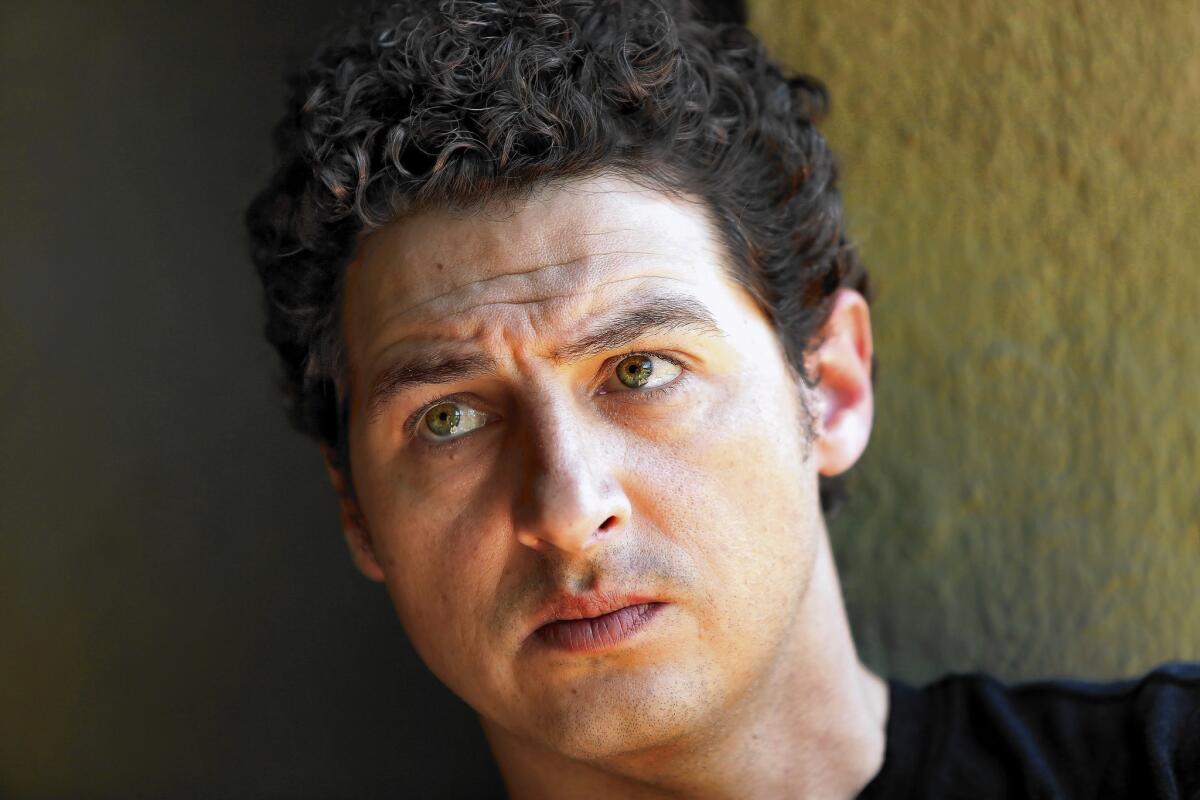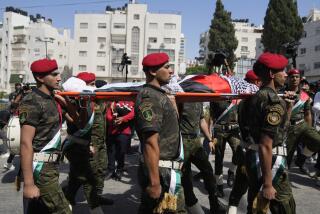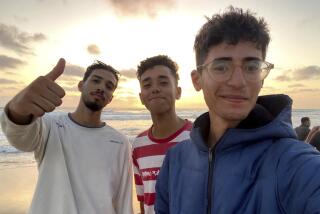Palestinian comic wrestles with current events in Mideast

Stand-up comedian Aron Kader is never at a loss for material. If his upbringing as a Palestinian American Mormon from Provo, Utah, isn’t enough, there’s always the Middle East.
“The problem over there is that the Jews and Arabs think they’re God’s chosen people,” the L.A.-based performer once told an audience at the Comedy Store during a flare-up of violence in the region. “If you’re God’s chosen people, why is there nothing but war and death over there? Look around, you’re in the desert!
“I mean, have you been to Barbados or Hawaii? It’s gorgeous over there. Maybe the Samoans are the chosen people. Have you thought of that?”
But recent events in the region have been anything but funny for Kader, who became widely known in comedy circles as part of Comedy Central’s Middle Eastern-themed show, “Axis of Evil.”
A distant Palestinian cousin of Kader’s, 16-year-old Mohammed Abu Khdeir, made global headlines when he was kidnapped off the street earlier this month in Israel, doused with gasoline and burned alive. He was part of Kader’s large extended family in the East Jerusalem neighborhood of Shuafat.
The kidnapping is believed to be in retaliation for the killing of three Israeli teens who were abducted and then murdered, allegedly by members of the Palestinian group Hamas.
The horrific incidents have led to escalating violence, rocket attacks and military strikes in Israel and Gaza.
“Comedians always want to have personal connections to their material,” said Kader, 39, last week at a cafe near his home in Los Angeles. “We all want to have a little bit of truth to our jokes so there’s a deeper layer to it.
“But the more specific you get about a personal experience, it better be funny. If people are gonna follow a story, it can’t lead you to tragedy. And this is tragedy.”
Kader never met his cousin Mohammed, but since the teen’s death, and another cousin’s beating by Israeli soldiers that went viral after being caught on video, Kader has appeared on CNN to talk about his family’s reaction in America to the killing.
He also recently wrote an op-ed piece for the network’s news site in hopes that readers would see Mohammed as more than another faceless victim.
But on stage, addressing the recent horror is another thing.
“I can’t talk about Mohammed up there,” said Kader, who looks more Irish than Arab with his light curly hair and freckles. He is outgoing, with a stand-up’s smart-alecky wit, but he becomes more serious when discussing his late cousin. “It will just bum everyone out. But I’ve heard from other family members that he was a funny guy. A prankster. He could tell a joke. He can’t do that anymore, but I can. I’ll at least honor him that way.”
Comedians who deal in hot topics often grapple with how far they can push audiences — and themselves — when it comes to uncomfortable or disturbing material, whether it is political, sexual or personal. Pushing buttons has deep roots in stand-up, from the insult comedy of Don Rickles to the nothing-is-off-limits style of Louis C.K. Richard Pryor’s famous monologues on racism and being black in America were both searing and hilarious.
“What works opposite tragedy and pain? Comedy,” said Jamie Masada, owner of the Laugh Factory. “For comedians, the stage is a sanctuary. It’s where they communicate all these things that no one else wants to bring up. But the timing has to be right — for everyone.”
And pain, of course, is the bedrock of most great comedy. L.A. comic Maria Bamford bases much of her act on her own mental illness, discussing everything from her bipolar II diagnosis to her stints in the psych ward.
“Whatever hits you hardest, that’s what you need to talk about as a creative person,” she said. “The art, the craftsmanship of getting a joke out, that takes time. So in rehearsing it, you’re also detaching from it. The material that once felt so sensitive is no longer as sensitive.”
“There are definitely things that are out of bounds on stage,” Kader said. “But it’s like having a conversation about race. We used to avoid it altogether. Now we talk pretty openly about it. I want it to be that way with the [Palestinian-Israeli] situation. I have confidence that what’s sensitive today won’t be sensitive tomorrow.”
Kader started his career in the late ‘90s with the intent to set himself apart by using his ethnicity as a backdrop for jokes about the absurdity of war, U.S.-Mideast relations and his Mormon upbringing.
It didn’t always work out.
During an era of suicide bombings in Israel, he’d tell this joke. “When I turned 19, the Mormon missionaries asked me if wanted to go on a mission. I said, look, to a Palestinian, a mission is a whole different thing. We don’t come back from those.”
Not surprisingly, everyone didn’t appreciate this kind of humor, and after losing an audience one night at the Comedy Store, Kader sat in the back of the room and watched the headliner, Paul Mooney.
Mooney is a veteran black comedian who wrote material for Pryor, “Sanford and Son” and “In Living Color.” “He was in his pimp clothes — a white suit and hat,” said Kader, recalling how Mooney brazenly opened his routine by repeating the N-word three times.
“He was saying things the white audience wasn’t sure about. Should we laugh? Is he talking to us or the three black guys in the room? What’s going on here? It didn’t matter. He had them. I thought, that’s what I wanna be. I wanna have control.”
Kader worked on his act and eventually rose to prominence post-9/11 as part of the Axis of Evil troupe, which included Iranian American Maz Jobrani and Egyptian American Ahmed Ahmed. “I talked about conflict, turned the Arab-Israeli thing into the way people fight — married people, siblings, whatever,” Kader said. “There were so many funny metaphors for fighting.”
Kader, a regular at the Comedy Store who will tour the Middle East this summer with a new troupe of Arab comics — the United Nations of Comedy — said he can always figure out how to make the Palestinian-Israeli conflict funny. But this time around, it may take some time and distance.
“I’m not good at being the angry comic,” he said. “I’ve been that before, and all it did was alienate people. It’s better if you can step back and be more of an observer or commentator rather than ranting. Who wants to pay 20 bucks to see that angry guy?
“If somebody was seeing me for the first time, I hope it would be provocative enough for them to think about the Middle East differently. But that’ll only come from being funny.”
More to Read
The complete guide to home viewing
Get Screen Gab for everything about the TV shows and streaming movies everyone’s talking about.
You may occasionally receive promotional content from the Los Angeles Times.







